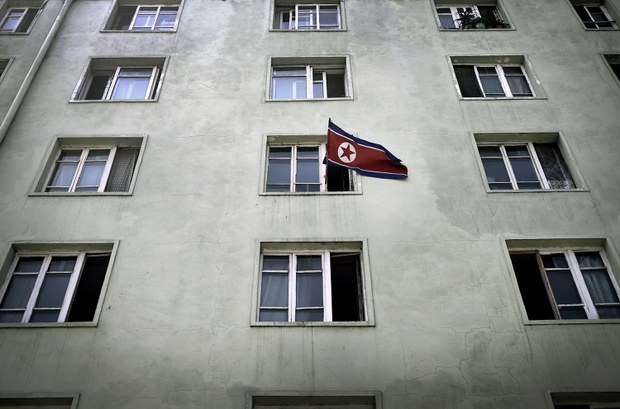North Korea orders citizens to fly the national flag from their homes during holidays
Share

A North Korean national flag is hung out of a window of an apartment building, Sunday, July 27, 2014, in Pyongyang, North Korea.
A North Korean order that citizens fly the national flag at their homes for the ruling party’s 77th anniversary on Monday has triggered complaints about the financial burden of buying flags when people can’t afford food, sources in the country told RFA.
North Korea has flown the blue-and-red-striped flag with the red star emblem since its establishment in 1948, and Monday marks the 77th anniversary of the 1945 formation of the precursor to the ruling Korean Workers’ Party.
Ahead of the anniversary, citizens who do not own flags had to buy one to comply with the order, a resident of the capital Pyongyang told RFA’s Korean Service last week on condition of anonymity for security reasons.
“The residents of Pyongyang were told to put up the national flag in their homes on the upcoming Party Foundation Day [on October 10],” she said. “The order was delivered by a party official during a lecture where the theme was “putting our nation first means putting our great leader [Kim Jong Un] first.”
Flying the flag at government buildings, law enforcement agencies and state-run factories has been standard procedure in North Korea, but sources told RFA that this is the first time that the authorities are making the citizens join them in the act of forced patriotism.
“From now on, Pyongyang citizens will have to raise the flag on their homes whenever there is a national holiday or major anniversary. The citizens will have to buy the flags themselves,” said the source.
The flags are available only at state-run stores and department stores. Small paper flags can cost 1,000 won (U.S.$0.12) and large cloth flags can cost about 10,000 won ($1.20). The average North Korean monthly salary is between 5,000 and 10,000 won, according to a report by South Korea-based NK News.
Citizens must raise the flags at their homes two days ahead of Party Foundation Day, a resident of South Pyongan province, north of Pyongyang, told RFA on condition of anonymity to speak freely.
“Not only for Party Foundation Day, but also when national holidays and anniversaries approach, residents are urged to display the national flag at their homes in recognition for their love of the nation, the flag, and the Highest Dignity,” she said, using an honorific term for Kim Jong Un.
“When they heard that they would have to go purchase the flags themselves they began to complain, saying ‘Does rice or money fall out of the national flag? It’s hard to make a living right now, so why are the authorities forcing us to buy flags?’” the second source said.
Once the order went public, shops at the Pyongsong marketplace began selling flags, according to the second source.
There are about 10 national holidays each year in North Korea, and these include the birthdays of previous leaders Kim Il Sung and Kim Jong Il, the grandfather and father of Kim Jong Un.
Authorities will begin asking neighborhood watch unit leaders to report which homes did not raise the flag on each holiday, so they can be punished, according to the source.
Punishment can be as mild as public criticism, but it can also be devastating. In the case of the relatively privileged citizens of Pyongyang, a failure to raise the flag at home can result in banishment from the capital and forced relocation to a rural part of the country.
Translated by Claire Shinyoung Oh Lee. Written in English by Eugene Whong.







